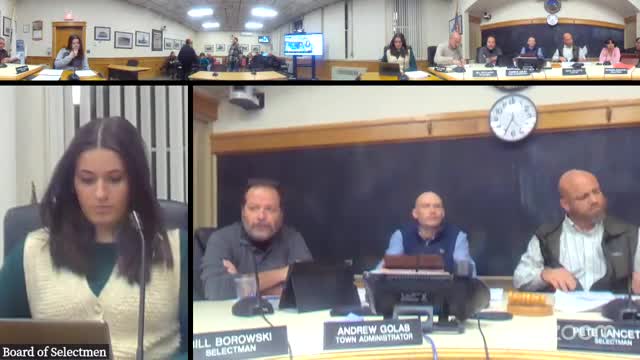Charlton board declares two dogs a nuisance, orders fencing and tethering
Get AI-powered insights, summaries, and transcripts
Subscribe
Summary
After a lengthy public hearing, the Charlton Select Board declared two dogs — Lily and Bear — a nuisance and ordered steps including a fence or electric containment, charged collars, and temporary leashing or tethering until containment is installed; the board asked animal control to verify compliance within about 30 days.
The Charlton Select Board voted to declare two dogs, Lily and Bear, a nuisance and issued orders to keep them confined after a neighbor raised repeated complaints about the animals entering yards and wandering onto Route 31.
The decision follows testimony from complainant Richard Kelly, animal control officer Kelly Flynn, and dog owner Jonathan Burnett during a public nuisance hearing held Jan. 14, 2025.
Kelly told the board his daughter was chased into the family’s house by one of the dogs on Oct. 23, 2024, and that the animals had entered his yard “daily, sometimes multiple times a day.” He asked the board for “immediate intervention to resolve this matter and ensure safety and peace of our community.”
Animal Control Officer Kelly Flynn described multiple calls and visits and said she had issued citations and recommended containment measures. “I’m very concerned that somebody could get hurt,” Flynn said, noting dogs had been seen on Route 31 where traffic can be fast and drivers do not always slow.
Owner Jonathan Burnett told the board the animals were not aggressive: “Those dogs are not at all aggressive in any form at all,” he said, and described steps he had taken or ordered, including a wireless electric fence and a stop on a sliding door to prevent accidental exits.
Select Board member Borowski moved to declare Lily and Bear a nuisance and to put the following orders into effect: require the owners to install a physical fence or, if too expensive, a properly maintained wireless electric fence with fitted collars for both dogs; keep the dogs on a leash or tether in compliance with Mass. Gen. Laws ch. 140, §174E until the containment is installed; and install childproof mechanisms on doors that lead outside if a young child is inadvertently allowing the dogs out. Borowski said declaring a nuisance “allows us the opportunity to require the conditions,” making enforcement possible.
The board also directed the Animal Control Officer to inspect and verify the ordered measures within about 30 days. Board members said the declaration is primarily an enforcement tool and expressed hope that, once containment is in place and verified, the parties would not need to return to the board.
The hearing record includes multiple written materials submitted by the complainant and Animal Control (the chair noted 37 pages of reports and a 16-page complaint). Flynn said the complainant later obtained police records through a public records request; she also confirmed at least one citation was paid and others remained unpaid.
The board discussed statutory limits, including Mass. Gen. Laws ch. 140, §157 (nuisance/dangerous dog statute) and §174E (tethering and confinement), and members noted the difference between a nuisance finding and a dangerous-dog finding. Several board members said they saw no evidence of aggression but that repeated loose-dog complaints supported the nuisance declaration to secure enforceable remedies.
The board’s motion passed. (Exact roll-call counts were not specified in the public transcript; the chair recorded the motion as approved with at least one member expressing reservations about declaring a nuisance but supporting enforcement.)
The board emphasized that if the required measures are verified by animal control the matter is likely to be closed; further incidents would lead to renewed enforcement action.
